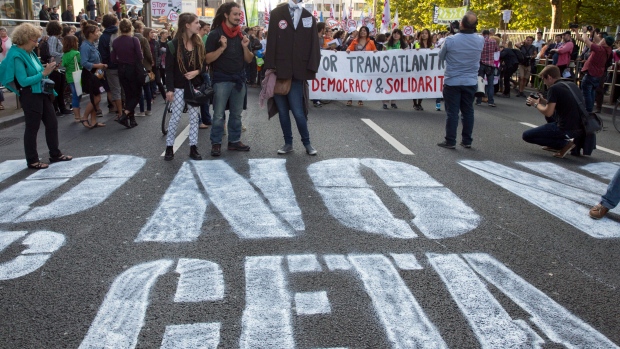Oct 14, 2016
What you need to know about Wallonia, the tiny Belgian region that's threatening CETA
, BNN Bloomberg

The Belgium regional government of Wallonia has thrown a wrench into a free-trade deal between Canada and the European Union, voting to reject the planned deal that is supported by Ottawa and all 28 EU national governments – including Belgium’s.
So how is this region of about 3.5 million people able to affect whether the Comprehensive Economic and Trade Agreement (CETA) lives or dies? Here’s what you need to know about the southern Belgian area.
Why does Wallonia matter for CETA?
The deal requires unanimous approval from the European Union's member countries, including Belgium. The Belgium constitution gives each of the countries three regions veto power over such agreements.
What did Wallonia decide?
Wallonia's regional legislature rejected the deal by a 46-14 margin on Friday, with one abstention – fearing the region’s farming and industrial sectors could be hurt by cheaper Canadian imports.
The land-locked region is made up of about 3.5 million people who are largely francophone. Wallonia’s deep coal mines and once-bustling steel industry have been hit hard by the economic shift away from manufacturing.
What is the state of Wallonia’s economy?
Wallonia makes up about 24 per cent of Belgium’s GDP, 0.2 per cent of global GDP and accounts for about 0.4 per cent of world trade.
The unemployment rate in the region is about 10 percent. That’s higher than the rest of Belgium as well as the EU’s average. Employment in the region has stabilized thanks to a “diverse temporary [government] initiatives targeting the safeguarding of jobs or the reduction of working time,” according to the European Commission.
What’s at stake for Wallonia in CETA?
Wallonian citizens also have less money in their pockets. While the purchasing power of Belgium as a whole is 120 per cent of the EU average, Wallonia’s purchasing power represents just 88 per cent of the EU average.
Wallonia’s exports have been recovering with the food sector selling more specialty cheeses, craft beer and sugar beets. A government-owned gun manufacturer FN Herstal is an undisputed giant in the arms market but has been criticized for selling the weapons to conflict zones in the Middle East.
Wallonia is the only region in Belgium to have had a trade surplus for five years, with a surplus of about $9.1 billion in 2012. That surplus represents about 12 per cent of its GDP. Within the countries of the EU, this performance is surpassed only by Ireland.
What else do I need to know about Wallonia?
The region’s official motto is "Walloon forever" in English.

